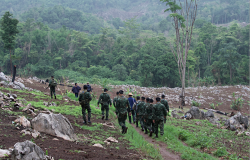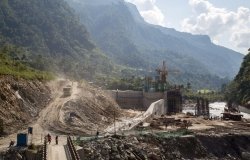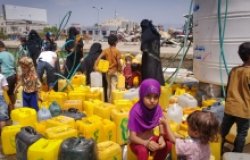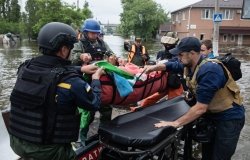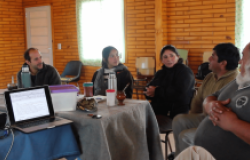New U.S. National Security Strategy Includes Environment, Health Issues
JUNE 2006--Relevant Passages Focus on Clean Energy, Natural Disasters, and Pandemic Diseases
Downplayed in the 2002 U.S. National Security Strategy (NSS), environmental challenges and health concerns return in the newest edition, released March 16, 2006. The NSS acknowledges that if left unaddressed, transboundary problems like pandemic disease, environmental destruction, and human trafficking can threaten national security. But it also points out that the responses to these problems can be catalysts for peace.
Introduction
While the security perspective of the current administration is still based on traditional concepts, this "wartime National Security Strategy" incorporates a diversified understanding of the role of poverty and development: even though "terrorism is not the inevitable by-product of poverty," it states clearly that "helping the world's poor is a strategic priority" (pages 9, 31).
The strategy rests on two pillars, which include, among other aspects:
Key environmental and health challenges mentioned in the strategy include energy development and security; environmental destruction and natural disasters; and biological weapons and emerging pandemics; as well as the lack of success in reaching a consensus at the Doha Round of the WTO negotiations on reducing or eliminating agriculture subsidies.
Energy
The "comprehensive energy strategy" outlined in the NSS calls for the United States to promote "secure, clean energy development" to help expand economic liberty and prosperity, protect the security of U.S. energy supplies, and reduce instability in oil-rich nations (page 25). Since 2002, the administration has "enhanc[ed] energy security and clean development" by expanding the types and sources of energy—including working with other nations on hydrogen, clean coal, and advanced nuclear technologies—and joining with "Australia, China, India, Japan, and the ROK in forming the Asia-Pacific Partnership for Clean Development and Climate to accelerate deployment of clean technologies to enhance energy security, reduce poverty, and reduce pollution" (pages 26-27).
Nuclear, Clean Coal, and Hydrogen
Nuclear energy is singled out as a particular challenge, as a loophole in the Non-Proliferation Treaty permits countries to produce fissile material that can be used to make nuclear weapons under cover of a civilian nuclear power program. "To close this loophole, we have proposed that the world's leading nuclear exporters create a safe, orderly system to spread nuclear energy without spreading nuclear weapons," under which states would access fuel at a reasonable cost, but would renounce enrichment and reprocessing capabilities (page 20). Thus, the United States "will help provide reliable, emission-free energy without making available separated plutonium that could be used by rogue states or terrorists for nuclear weapons." In addition, The Global Nuclear Energy Partnership will "work with other nations to develop and deploy advanced nuclear recycling and reactor technologies these new technologies will make possible a dramatic expansion of safe, clean nuclear energy to help meet the growing global energy demand" (page 29).
The United States will continue to "develop other transformational technologies such as clean coal and hydrogen" with international partners, and invest domestically in "zero-emissions coal-fired plants; revolutionary solar and wind technologies; clean, safe nuclear energy; and cutting-edge methods of producing ethanol" (page 29).
Oil Dependence and the Petroleum Curse
The NSS warns that "many countries are too dependent on foreign oil, which is often imported from unstable parts of the world The world's dependence on these few suppliers in neither responsible nor sustainable over the long term" (page 27-8). The United States, which relies on international sources for more than 50 percent of its supply, is no exception: "The key to ensuring our energy security is diversity in the regions from which energy resources come and in the types of energy resources on which we rely" (page 28). This "comprehensive energy strategy" claims:
Diversification of energy sources also will help alleviate the "petroleum curse"—the tendency for oil revenues to foster corruption and prevent economic growth and political reform in some oil-producing states. In too many such nations, ruling elites enrich themselves while denying the people the benefits of their countries' natural wealth. In the worst cases, oil revenues fund activities that destabilize their regions or advance violent ideologies. Diversifying the suppliers within and across regions reduces opportunities for corruption and diminishes the leverage of irresponsible rulers. (page 29)
To support this effort, the administration will "work with resource-rich countries to increase their openness, transparency, and rule of law" to "attract the investment essential to developing their resources and expanding the range of energy suppliers" (page 20).
Energy and China, Central Asia
China, which receives particular attention in the NSS, is specifically cautioned against "acting if they can somehow ‘lock up' energy supplies around the world or seek to direct markets rather than opening up"; and also against "supporting resource-rich countries without regard to the misrule at home or misbehavior abroad of those regimes"—a pointed comment most likely directed at Chinese deals for oil supplies in Sudan and Venezuela (page 41). However, the NSS also sees energy security as a "mutual interest" that "can guide our cooperation" (page 41). The strategy for Central Asia—an "enduring priority for our foreign policy"—also includes a direction to "diversify global sources of energy" (page 40).
Environment
While the administration has "faced challenges in forging consensus with other major nations on the most effective measures to protect the environment," the NSS recognizes that environmental issues, "if left unaddressed can threaten national security" (pages 36, 47). "Environmental destruction, whether caused by human behavior or cataclysmic mega-disasters such as floods, hurricanes, earthquakes, or tsunamis" is one of the new challenges raised by globalization; "problems of this scope may overwhelm the capacity of local authorities to respond, and may even overtax national militaries, requiring a larger international response" (page 47). Such natural disasters, as with deadly pandemics, can produce "WMD-like effects" (page 44).
Preparing to respond to the challenge of environmental destruction "requires the full exercise of national power, up to and including traditional security instruments," as demonstrated by the U.S. military's critical logistical support in the response to the Southeast Asian tsunami and the South Asian earthquake (page 44). Going forward, the NSS proposes establishing a "civilian reserve corps, analogous to the military reserves" that would use "the human resources of the American people for skills and capacities needed for international disaster relief and post-conflict reconstruction" (page 45).
Cooperation and Peacebuilding
The NSS sees a silver lining in these natural disasters:
The response [to environmental destruction] and the new partnerships it creates can sometimes serve as a catalyst for changing existing political conditions to address other problems. For example, the response to the tsunami in Southeast Asia and the earthquake in Pakistan developed new lines of communication and cooperation at a local level, which opened the door to progress in reconciling long-standing regional conflicts in Aceh and the Kashmir. (page 48)
The NSS credits humanitarian actions by India following the Pakistan earthquake with making "a new spirit of cooperation in the dispute over Kashmir" more tangible (page 14). Similarly, "the cooperative approach to the relief effort following the tsunami that hit Indonesia resulted in political shifts that helped make possible a peaceful settlement in the bitter separatist conflict in Aceh" (page 14). In this same vein, the administration proposes to increase its cooperation with China to reverse environmental degradation.
Health
Health concerns received comprehensive coverage; biological weapons remained near the top of the agenda, and HIV/AIDS and emerging pandemics, such as avian influenza, also garnered a share of spotlight. The NSS called for efforts to cooperate with other "effective democracies" to combat these potentially devastating transboundary threats in innovative ways.
Biological weapons
The U.S. strategy should focus on "improving our capacity to detect and respond to biological attacks, securing dangerous pathogens, and limiting the spread of materials useful for biological weapons" (page 22). The activities already underway—working with "partner nations and institutions to strengthen global biosurveillance capabilities" and "initiatives to modernize our public health infrastructure and to encourage industry to speed the development of new classes of vaccines and medical countermeasures" will also help the U.S. response to pandemic diseases, such as avian influenza (page 22).
Pandemics
Deadly pandemics recognize no borders and can produce "WMD-like effects," thus posing a catastrophic challenge to national security, with "risks to social order so great that traditional public health approaches may be inadequate, necessitating new strategies and responses" (page 44, 47). "These challenges require effective democracies to come together in innovative ways," the report stated.
The NSS praised the President's Emergency Plan for AIDS Relief as "an unprecedented, 5-year, $15 billion effort to prevent 7 million new infections, provide treatment to 2 million infected individuals, and care for 10 million AIDS orphans and others affected by the disease" (page 31). In addition, the United States has "launched a $1.2 billion, 5-year initiative to reduce malaria deaths by 50 percent in at least 15 targeted countries" and "pioneered the creation of the Global Fund to Fight HIV/AIDS, Tuberculosis, and Malaria," contributing more than $1.4 billion—more than any other donor (page 31).
To fight future pandemics, the administration has created the International Partnership on Avian and Pandemic Influenza, "a new global partnership of states committed to effective surveillance and preparedness that will help to detect and respond quickly to any outbreaks of the disease" (page 48). (In addition, China was again singled out as a focus for cooperative efforts to combat disease pandemics.) The NSS claimed that "effective democracies are better able to deal with these challenges than are repressive or poorly governed states," since "pandemics require robust and fully transparent public health systems, which weak governments and those that fear freedom are unable or unwilling to provide" (page 48).
Population
The NSS did not directly address population issues, although human trafficking, illegal immigration, and lack of basic human rights (including women's rights) were mentioned as security issues.
By Meaghan Parker and Todd Walters
Related Programs

Environmental Change and Security Program
The Environmental Change and Security Program (ECSP) explores the connections between environmental change, health, and population dynamics and their links to conflict, human insecurity, and foreign policy. Read more

Maternal Health Initiative
Life and health are the most basic human rights, yet disparities between and within countries continue to grow. No single solution or institution can address the variety of health concerns the world faces. By leveraging, building on, and coordinating the Wilson Center’s strong regional and cross-cutting programming, the Maternal Health Initiative (MHI) promotes dialogue and understanding among practitioners, scholars, community leaders, and policymakers. Read more
